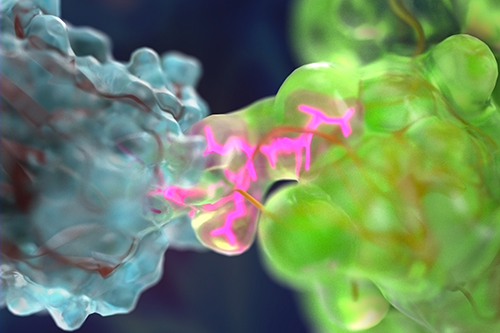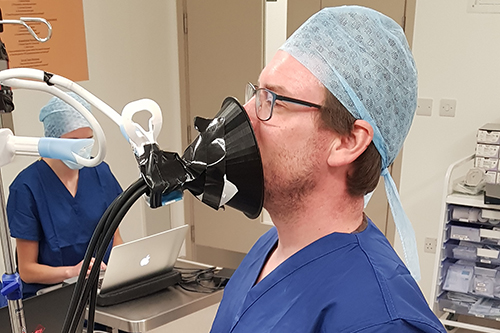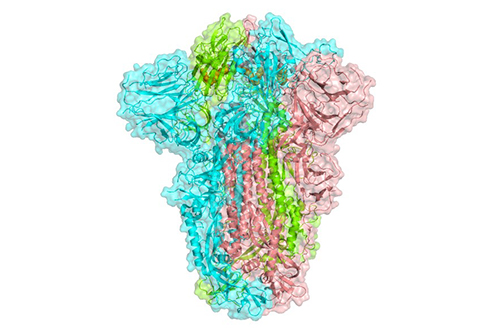Experts quickly mobilised to switch their focus and have been researching everything from how the virus behaves at a molecular level to the far-reaching impact of the pandemic on society.
Here we highlight the main findings and discoveries since the start of the pandemic:
Understanding the virus
In February 2020, Bristol virologists, Drs Andrew Davidson and David Matthews, were one of the first teams in the UK to grow SARS-CoV-2 in the lab. They quickly began to sequence its genetic material, and this has enabled teams around the world to work safely with the live virus.
Since then, Drs Davidson and Matthews have worked with many colleagues to learn more about COVID-19. In one major breakthrough, researchers found a protein called Neuropilin-1 drives higher infectivity of SARS-CoV-2. Based on the research, led by Professor Peter Cullen and Drs Yohei Yamauchi and Boris Simonetti, pharmaceutical company aTyr Pharma is working on a potential treatment which is being trialled in patients with severe COVID-19.
Improving treatments
In efforts to treat COVID-19, an analysis of seven trials, led by Bristol’s Professor Jonathan Sterne, found certain types of steroids reduce the risk of death by 20 per cent in critically ill COVID-19 patients. The study, by an international team of scientists, was co-ordinated by the World Health Organisation (WHO) and has led to better treatment of the virus in hospitals and saved countless lives across the world.
Research teams are also looking at COVID-19 treatments which can be used to stop the virus in its tracks before it develops. A potential 'game changer' was the discovery of a druggable pocket in the SARS-CoV-2 Spike protein that could stop the virus in its tracks. The research team, led by Professors Christiane Berger-Schaffitzel and Imre Berger, is now working on a possible new antiviral treatment that could target the druggable pocket.
Vaccine trials
Bristol researchers and colleagues at University Hospitals Bristol and Weston NHS Foundation Trust (UHBW) and North Bristol NHS Trust (NBT), led by Professor Adam Finn and Dr Rajeka Lazarus, have carried out clinical trials to assess how well the Oxford-AstraZeneca, Janssen and Valneva vaccines work to prevent people from becoming infected with COVID-19.
Currently, the researchers are trialling combinations of vaccines and intervals between doses and assessing the safety and immune responses of the Oxford-AstraZeneca vaccine in children and young adults aged six to 17-years-old. Without the participation of nearly 2,000 local Bristol residents, these trials would not have been possible.
Monitoring the effectiveness of vaccines
With the COVID-19 vaccination programme well underway, researchers have been assessing the vaccines’ effectiveness. Last month, interim results from the AvonCAP study, led by Professor Adam Finn and Dr Catherine Hyams, showed one dose of the Pfizer-BioNTech and Oxford-AstraZeneca vaccines is highly effective in preventing hospitalisation of people in their 80s.
With new variants being found across the world, research by our mathematical modellers Drs Ellen Brooks Pollock and Leon Danon, along with Exeter University, found the highly infectious variant of the SARS-CoV-2 variant discovered in Kent is between 30 and 100 per cent more deadly than previous strains.
Impact on wellbeing and society
Longitudinal studies have been playing an important part in our understanding of COVID-19 and the conditions the pandemic has brought with it. Considering mental health, work from Bristol’s world-leading birth cohort study Children of the 90s, led by Dr Rebecca Pearson and Alex Kwong, has shown that the proportion of young people experiencing anxiety at the beginning of the pandemic almost doubled, at 24 per cent compared with a pre-pandemic level of 13 per cent. These effects were still present when restrictions were eased in summer 2020 with 24 per cent still experiencing anxiety.
This week, Children of the 90s will launch a new COVID-19 antibody testing study with over 9,000 of its Bristol-based participants to understand the asymptomatic spread of the disease as part of a nationwide study.
Dr Emma Williamson worked with Women’s Aid to capture data and insights to show domestic abuse had worsened during the pandemic, with perpetrators using the restrictions as a tool to stop victims from leaving or seeking help. Their findings helped to shape government policy and were used as part of a BBC One Panorama documentary highlighting the issue.
Getting back to normal
The performing arts have been particularly hit hard by the restrictions enforced during the coronavirus pandemic. Last year, a research project known as PERFORM found that singing was no riskier than talking. The research, carried out by a collaborative team including Professor Jonathan Reid, Director of Bristol Aerosol Research Centre (BARC), has supported guidance for live musical performances and the safe distancing of performers and audience members.
Professor Philip Taylor, Pro Vice-Chancellor for Research and Enterprise at the University of Bristol, said: "The COVID-19 pandemic is an unprecedented time in our history and has affected everyone across the world. I would like to thank my colleagues across the University community who have stepped up to contribute to vital COVID-19 research in our understanding of the disease. We have published over 170 research papers about COVID-19 to-date and our research will continue to deliver wide-reaching impact in the fight against COVID-19."
Adam Finn, Professor of Paediatrics at Bristol, Director of the Bristol Vaccine Centre at Bristol Medical School and lead of Bristol UNCOVER (Bristol COVID Emergency Research Group), added: "Bristol researchers united really quickly to collaborate on finding ways to overcome the disease. There has also been an enormous willingness by members of the public to come forward and take part in COVID-19 trials. Their act of selflessness has played - and will continue to play - a crucial part in reducing infection rates and saving lives."
Our research efforts have been possible thanks to Bristol’s Elizabeth Blackwell Institute, which has supported 86 research projects at the University to-date, with funding of £836,000.
University of Bristol alumni and friends from across the world have also generously donated £394,858 to support our vital COVID-19 research.


